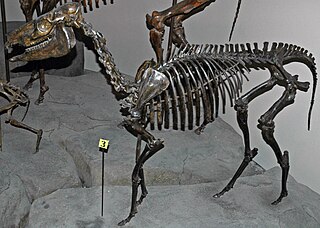 W
WAcritohippus is an extinct genus of equine from North America.
 W
WAnchitherium was a fossil horse with a three-toed hoof.
 W
WCormohipparion is an extinct genus of horse belonging to the tribe Hipparionini that lived in North America during the late Miocene to Pliocene.
 W
WCremohipparion is an extinct genus of horse living in Eurasia and Africa during the Miocene through Pliocene.
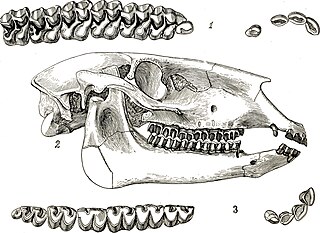 W
WDesmatippus is an extinct, three-toed, browsing member of the Equidae. It lived in what is now North America during the Miocene period. Desmatippus was 60 cm height and 20 kg in weight.
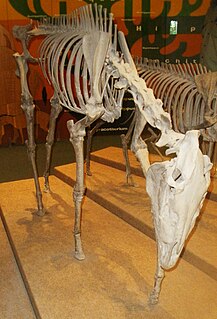 W
WDinohippus is an extinct equid which was endemic to North America from the late Hemphillian stage of the Miocene through the Zanclean stage of the Pliocene and in existence for approximately 6.7 million years . Fossils are widespread throughout North America, being found at more than 30 sites from Florida to Alberta and Panama.
 W
WEquinae is a subfamily of the family Equidae, which have lived worldwide from the Hemingfordian stage of the Early Miocene onwards. They are thought to be a monophyletic grouping. Members of the subfamily are referred to as equines; the only extant equines are the horses, asses, and zebras of the genus Equus.
 W
WEquini is the only living tribe of the horse subfamily Equinae, which has lived worldwide since the Hemingfordian stage of the Early Miocene. It is considered to be a monophyletic clade.
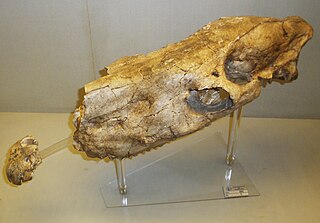 W
WEurygnathohippus is an extinct genus of hipparionine horse. The majority of known fossils of members of this genus were discovered in Africa, where members of this genus lived during the late Miocene to Pleistocene interval. Fossils of Eurygnathohippus were also reported from the late Pliocene sediments of the Potwar Plateau in Pakistan and the Siwalik Hills in northwest India.
 W
WHipparion is an extinct genus of horse that lived in North America, Asia, Europe, and Africa during the Miocene through Pleistocene ~23 Mya—781,000 years ago. It lived in non-forested, grassy plains, shortgrass prairie or steppes.
 W
WHippotherium is an extinct genus of horse that lived in during the Miocene through Pliocene ~13.65—3.3 Mya, existing for 10.35 million years .
 W
WHypohippus is an extinct genus of three-toed horse, which lived 17–11 million years ago. It was the size of a pony, and fossils of it have been found in Nebraska, Colorado, and Montana.
 W
WKalobatippus was a genus of Anchitheriinae Equid. It ate leaves and was characterized by unusually long legs. It lived 24 to 19 million years ago. It gets its name from the elongated bones between the ankle/wrist and the toes.
 W
WMegahippus is an extinct equid genus belonging to the subfamily Anchitheriinae. As with other members of this subfamily, Megahippus is more primitive than the living horses. Fossil remains of Megahippus have been found across the U.S., from Montana to Florida.
 W
WMerychippus is an extinct proto-horse of the family Equidae that was endemic to North America during the Miocene, 15.97–5.33 million years ago. It had three toes on each foot and is the first horse known to have grazed.
 W
WNannippus is an extinct genus of three-toed horse endemic to North America during the Miocene through Pliocene, about 13.3—3.3 million years ago (Mya), living around 11.1 million years.
 W
WNeohipparion is an extinct genus of equid, from the Neogene of North America and Central America.
 W
WParahippus is an extinct equid, a relative of modern horses, asses and zebra. It was very similar to Miohippus, but slightly larger, at around 1 metre tall, at the withers.
 W
WPliohippus is an extinct genus of Equidae, the "horse family". Pliohippus arose in the middle Miocene, around 15 million years ago. The long and slim limbs of Pliohippus reveal a quick-footed steppe animal. While some specimens have one toe per leg, others have three.
 W
WProtohippus is an extinct three-toed genus of horse. It was roughly the size of a modern donkey. Fossil evidence suggests that it lived during the Late Miocene, from about 13.6 Ma to 5.3 Ma.
 W
WPseudhipparion is an extinct genus of horse endemic to North America during the Miocene.
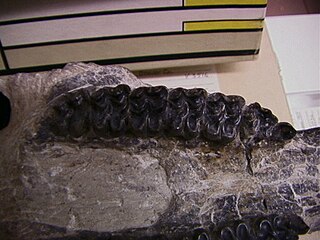 W
WScaphohippus is an extinct Miocene genus of equine, with two known species, known from fossils found in California, New Mexico, Montana, and Nebraska.
 W
WSinohippus is an extinct equid genus belonging to the subfamily Anchitheriinae.